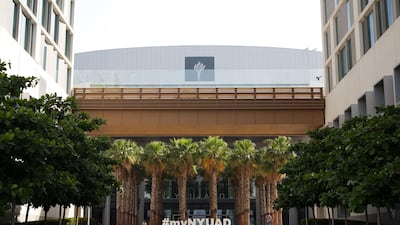Researchers in the UAE have identified compounds that may help to suppress the growth of cancerous tumours.
The scientists at NYU Abu Dhabi found that the small compounds, called mimetics, could prolong the survival of mice with certain types of cancer, potentially opening up new ways of treating people.
It is the latest breakthrough in the laboratory of Dr Mazin Magzoub, an associate professor, who previously found that similar protein mimetics may be effective at combating Alzheimer’s disease and Type II diabetes.
Published in Nature Communications, the study – the product of about five years of research – centres on another protein, p53, which has potent anti-cancer properties.
NYU Abu Dhabi
This protein is “a major focus of cancer research”, said Dr Magzoub, a British scientist working at NYU Abu Dhabi since 2012.
“It’s the most commonly mutated protein in cancer and therefore a major therapeutic target," he said.
When functioning correctly, p53 stops cancer cells from growing by causing them to go through programmed cell death, or by helping to correct mistakes in their DNA that may otherwise make them cancerous.
However, mutations in p53 may cause it to clump together or aggregate and lose its anti-cancer function, allowing cancer cells to multiply.
Previous research by Dr Magzoub and his collaborators found that protein mimetics could be used to treat Alzheimer’s disease and Type II diabetes, because they combat similar protein aggregation associated with those disorders.
In the latest study, the researchers looked at whether protein mimetics could break down p53 aggregates too, something that would free up p53 to carry out its anti-cancer function. These protein mimetics have been patented by Dr Magzoub and his co-researchers.
"We speculated we could use the same approach to dissociate p53 aggregates,” said Dr Magzoub.
The researchers tested various mimetics on laboratory-grown cancer cells, including pancreatic, breast, lung and colon cancer cells, in each of which were aggregation-causing mutations in p53.
They selected those mimetics effective at preventing the growth of these cancer cells.
Successful tests on mice

Following these “in vitro” tests, meaning that they took place outside living organisms, they undertook “in vivo” studies in actual living organisms. These involved mice with cancerous tumours, some caused by mutations in p53.
The researchers found the mimetics increased survival rates in mice that had tumours caused by p53 mutations, but mice with tumours not linked to p53 did not live longer.
This suggests that the mimetics help reactivate the anti-cancer properties of p53 after it has formed aggregates.
“The results of the in-vivo model were really remarkable,” said Dr Magzoub. “There’s substantial shrinkage of the tumours that bear aggregation-causing mutations in p53.”
The remaining cells in tumours caused by p53 mutations were analysed following treatment and found to be almost like normal cells, suggesting the mimetics had freed up p53 to carry out its anti-cancer activity.
In a separate finding, the mimetics were shown to be non-toxic to healthy cells, suggesting they would be well tolerated if used against cancer.
Any use of the mimetics in people is a long way off, but the research suggests they warrant further investigation as potential cancer therapeutics.
Dr Magzoub’s laboratory is additionally looking at ways of using tiny nanoparticles to deliver the mimetics directly to the tumours, as this would reduce the amount of any drug lost in circulation in the blood.
"They can be taken up in the bloodstream and delivered to the target region … We are working to make a very stable carrier for precisely this purpose,” said Dr Loganathan Palanikumar, a research associate in Dr Magzoub’s laboratory.
Dr Palanikumar undertook much of the experimental work for the latest paper, with Laura Karpauskaite, an NYU Abu Dhabi postgraduate research fellow, and Ibrahim Chehade, a biology programme instructor.
Other researchers at NYU Abu Dhabi involved in the study were Dr Mohamed Al Sayegh, a research assistant professor, Prof Gennaro Esposito, a visiting professor of chemistry, and Dr Ahmed Afzal, a lecturer of biology.
The work is a collaboration with the laboratories of Prof Andrew Hamilton, the president of NYU, and Dr Sunil Kumar, an assistant professor at the University of Denver.






